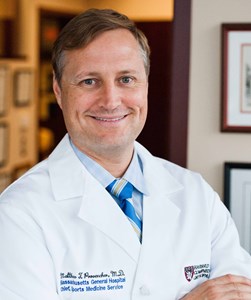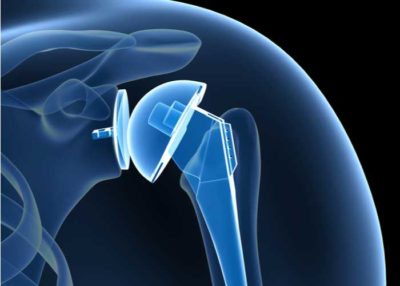Shoulder Joint Surgeon

Are you experiencing shoulder pain or instability after receiving a total shoulder replacement? If so. you may need revision shoulder arthroplasty to reposition and repair the prosthetic. Orthopedic shoulder surgeon, Dr. Matthew Provencher provides diagnosis and treatment options for patients in Vail, Aspen, Colorado Springs, and the Denver, Colorado area, who are experiencing symptoms of a failed shoulder arthroplasty. Contact Dr. Provencher’s team today!
What is shoulder arthroplasty?
A shoulder arthroplasty, also known as a total shoulder replacement, is a well-established and successful surgical procedure for treating severe shoulder pain and stiffness resulting from degenerative joint disease or end-stage arthritis. In this procedure, the damaged components of the glenohumeral joint are replaced with prosthetic implants. A metal ball replaces the damaged head of the humerus (upper arm bone) and a plastic cup is used to resurface the glenoid socket of the scapula (shoulder blade). The goal of a shoulder arthroplasty is to mitigate shoulder pain while restoring motion, function, and strength back to the shoulder.
What is a revision shoulder arthroplasty?
A revision shoulder arthroplasty involves the removal of one or more malpositioned prosthesis components. The new component is repositioned properly and fixed into place. If necessary, soft tissue reconstruction using allografts (donated tissue grafts) may aid in the balancing of the muscles and tendons in the shoulder.
When causes failure of a shoulder arthroplasty?
Although a shoulder arthroplasty generally has excellent results, the following are some reasons why this procedure might fail:
- Failure of compliance with post-operative care instructions, poor participation in the physical rehabilitation program, or too much stress is applied on the newly repaired tissues.
- The development of scar tissue or bone spurs (osteophytes) can interfere with the shoulder prosthesis.
- Weakening of the supporting shoulder muscles can cause the rapid deterioration of the shoulder prosthesis.
- A new shoulder injury, such as a fracture or fall, can loosen the prosthetic implant.
- Not as common, the shoulder prosthesis may loosen, become infected, or dislocate
- Less commonly seen are cases of the shoulder implant becoming infected, dislocated, or loosening without injury.
- Because a shoulder arthroplasty is a technically complex surgical procedure, patients who elect surgeons that do not perform a large number of shoulder replacement procedures are more likely to experience complications resulting in shoulder arthroplasty failure.
A revision shoulder arthroplasty may be an option to alleviate the shoulder pain and stiffness associated with a failed shoulder arthroplasty. Dr. Matthew T. Provencher, orthopedic shoulder doctor, treats patients in Vail, Aspen, Colorado Springs, and the Denver, Colorado area who have experienced a shoulder arthroplasty failure and are in need of a revision shoulder arthroplasty.
When should a revision shoulder arthroplasty be considered?
A revision shoulder arthroplasty is a decision that should be carefully considered. Dr. Provencher will obtain a comprehensive medical history and perform a thorough physical examination. Diagnostic imaging, such as x-rays and magnetic resonance imaging (MRI), may be requested to accurately identify any damage to the structures of the shoulder joint. Additional imaging, such as an MR arthrogram, may also be needed to rule out a compromised blood flow of the shoulder joint. The electromyographic nerve test (EMG) may also be needed to assess the quality of nerve around the shoulder joint.
The following are some important factors that Dr. Provencher will take into account when considering a revision shoulder arthroplasty:
Infection.
Infection following a shoulder replacement is a significant concern when considering a revision shoulder arthroplasty. If an infection is suspected, Dr. Provencher will order laboratory studies, including a shoulder biopsy, to confirm an infection is present. Antibiotics are generally the primary treatment course if an infection is confirmed. Removal of the prosthetic implant is common when the infection lies deep in the shoulder alongside the shoulder prosthesis. Depending on the extent of infection, patients may require several surgical procedures to completely eliminate the infection. On occasion, a temporary shoulder joint spacer may be implemented while the infection is undergoing treatment.
Joint Stability.
There are several reasons that may cause shoulder joint instability: loosening and/or poor alignment of the shoulder prosthesis, damage to the soft tissues, a shoulder fracture, or anatomical deformities. If the shoulder joint is determined to be unstable during the physical examination by Dr. Provencher, additional joint testing and imaging will be performed to identify the specific cause and determine the appropriate treatment plan.
Joint Loosening.
In the event of the prosthetic implant loosening or dislocating, Dr. Provencher will evaluate the patient’s age, rotator cuff condition, and bone availability to determine the type of revision procedure that will provide the best outcome.
Shoulder Prosthesis Condition.
If the shoulder prosthesis has deteriorated resulting in shoulder pain and loosening of the implant, Dr. Provencher will assess the condition of the prosthetic implant to identify the best mechanical solution for treating these symptoms.
Rotator Cuff Condition.
A revision shoulder arthroplasty is typically the recommended treatment in patients with damaged or torn rotator cuffs. Instability of the shoulder often develops when damage to the rotator cuff is left untreated thereby resulting in the need for a revision shoulder arthroplasty.
For more information on revision shoulder arthroplasty, or to discuss your shoulder arthritis treatment options, please contact the office of Matthew T. Provencher, MD, orthopedic shoulder doctor at The Steadman Clinic, serving Vail, Aspen, Colorado Springs, and the Denver, Colorado area.
